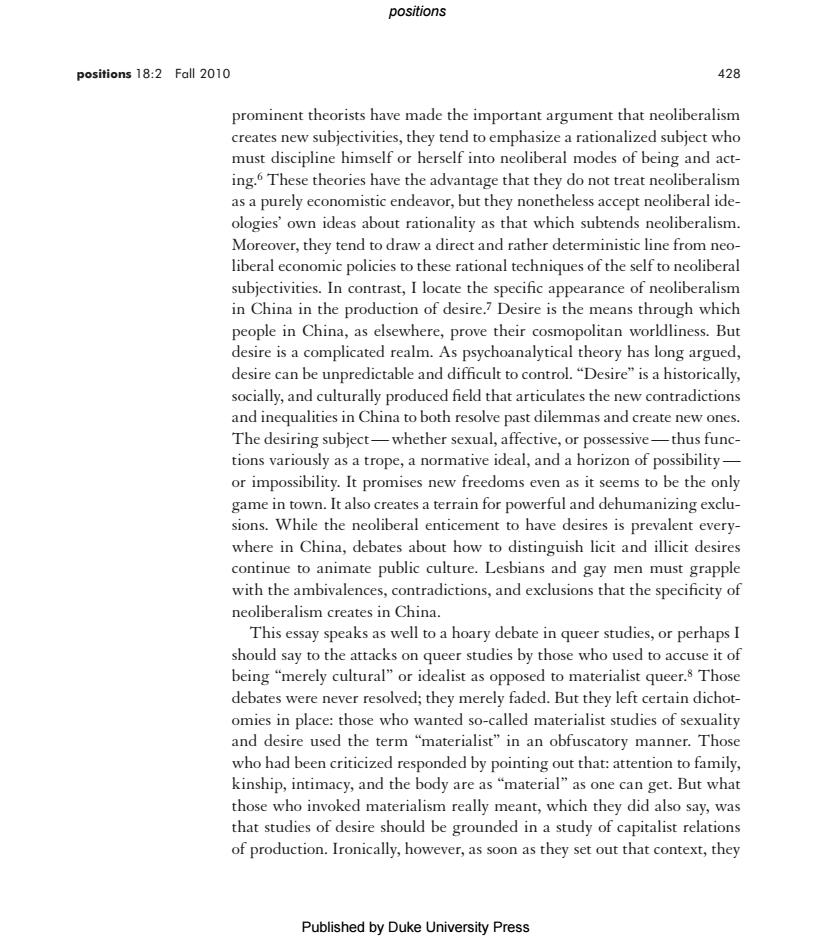正在加载图片...

positions positions 18:2 Fall 2010 428 prominent theorists have made the important argument that neoliberalism creates new subjectivities,they tend to emphasize a rationalized subject who must discipline himself or herself into neoliberal modes of being and act- ing.These theories have the advantage that they do not treat neoliberalism as a purely economistic endeavor,but they nonetheless accept neoliberal ide- ologies'own ideas about rationality as that which subtends neoliberalism. Moreover,they tend to draw a direct and rather deterministic line from neo- liberal economic policies to these rational techniques of the self to neoliberal subjectivities.In contrast,I locate the specific appearance of neoliberalism in China in the production of desire.?Desire is the means through which people in China,as elsewhere,prove their cosmopolitan worldliness.But desire is a complicated realm.As psychoanalytical theory has long argued, desire can be unpredictable and difficult to control."Desire"is a historically, socially,and culturally produced field that articulates the new contradictions and inequalities in China to both resolve past dilemmas and create new ones. The desiring subject-whether sexual,affective,or possessive-thus func- tions variously as a trope,a normative ideal,and a horizon of possibility- or impossibility.It promises new freedoms even as it seems to be the only game in town.It also creates a terrain for powerful and dehumanizing exclu- sions.While the neoliberal enticement to have desires is prevalent every- where in China,debates about how to distinguish licit and illicit desires continue to animate public culture.Lesbians and gay men must grapple with the ambivalences,contradictions,and exclusions that the specificity of neoliberalism creates in China. This essay speaks as well to a hoary debate in queer studies,or perhaps I should say to the attacks on queer studies by those who used to accuse it of being"merely cultural"or idealist as opposed to materialist queer.s Those debates were never resolved;they merely faded.But they left certain dichot- omies in place:those who wanted so-called materialist studies of sexuality and desire used the term "materialist"in an obfuscatory manner.Those who had been criticized responded by pointing out that:attention to family, kinship,intimacy,and the body are as"material"as one can get.But what those who invoked materialism really meant,which they did also say,was that studies of desire should be grounded in a study of capitalist relations of production.Ironically,however,as soon as they set out that context,they Published by Duke University Presspositions 18:2 Fall 2010 428 prominent theorists have made the important argument that neoliberalism creates new subjectivities, they tend to emphasize a rationalized subject who must discipline himself or herself into neoliberal modes of being and acting.6 These theories have the advantage that they do not treat neoliberalism as a purely economistic endeavor, but they nonetheless accept neoliberal ideologies’ own ideas about rationality as that which subtends neoliberalism. Moreover, they tend to draw a direct and rather deterministic line from neoliberal economic policies to these rational techniques of the self to neoliberal subjectivities. In contrast, I locate the specific appearance of neoliberalism in China in the production of desire.7 Desire is the means through which people in China, as elsewhere, prove their cosmopolitan worldliness. But desire is a complicated realm. As psychoanalytical theory has long argued, desire can be unpredictable and difficult to control. “Desire” is a historically, socially, and culturally produced field that articulates the new contradictions and inequalities in China to both resolve past dilemmas and create new ones. The desiring subject— whether sexual, affective, or possessive— thus functions variously as a trope, a normative ideal, and a horizon of possibility— or impossibility. It promises new freedoms even as it seems to be the only game in town. It also creates a terrain for powerful and dehumanizing exclusions. While the neoliberal enticement to have desires is prevalent everywhere in China, debates about how to distinguish licit and illicit desires continue to animate public culture. Lesbians and gay men must grapple with the ambivalences, contradictions, and exclusions that the specificity of neoliberalism creates in China. This essay speaks as well to a hoary debate in queer studies, or perhaps I should say to the attacks on queer studies by those who used to accuse it of being “merely cultural” or idealist as opposed to materialist queer.8 Those debates were never resolved; they merely faded. But they left certain dichotomies in place: those who wanted so-called materialist studies of sexuality and desire used the term “materialist” in an obfuscatory manner. Those who had been criticized responded by pointing out that: attention to family, kinship, intimacy, and the body are as “material” as one can get. But what those who invoked materialism really meant, which they did also say, was that studies of desire should be grounded in a study of capitalist relations of production. Ironically, however, as soon as they set out that context, they positions Published by Duke University Press